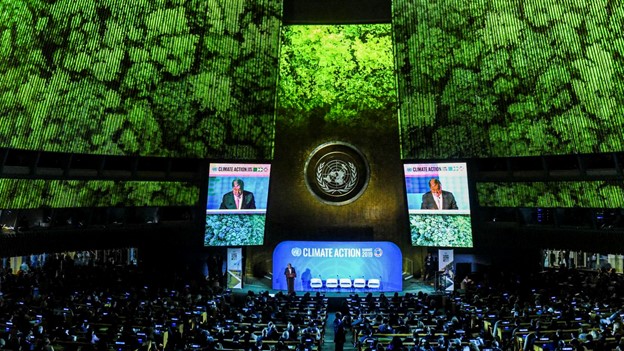To meet the U.N. climate goals, the U.S. and China need some healthy competition.
Every year, world leaders convene at a U.N. summit to discuss how they will work together to stop climate change. Yet, global greenhouse gas emissions continue to rise. Although, there was a brief dip in emission levels in 2020 due to the pandemic, by December emissions rebounded and were higher than levels in December 2019. Cooperation on climate change is something world leaders cannot seem to get right.
On Earth Day, President Biden held the Leader’s Climate Summit to jumpstart negotiations before leaders gather in Glasgow, Scotland in November for the U.N. summit. While many countries announced ambitious targets and international commitments at the summit, it is unclear whether these will be effectively implemented or just more hot air.
President Biden has made it clear that climate change is a top priority for his administration, and he is trying to position the U.S. as a climate leader. Furthermore, Biden has also made it clear that he wants to cooperate with China to reduce global emissions. The President’s climate envoy, John Kerry, recently stated the U.S. would “compartmentalize” climate negotiations with China to keep them moving, despite tensions in other areas.
During the Leader’s Climate Summit, President Xi Jinping reaffirmed China’s commitment to fighting climate change, and announced China’s plan to phase down coal consumption. Over the past four years, China has been trying to fill the leadership vacuum in climate policy left by the U.S. under former President Trump. At the 2020 U.N. Climate Summit, President Xi Jinping surprised the world when he announced China’s plan to be carbon neutral by 2060, stating that the world cannot continue “pursuing development at the expense of protection.” Despite these expressed commitments, China’s most recent five-year plan had almost no mention of how the country would reach these goals.
World leaders believe that international agreements, like the Paris Agreement, will solve climate change. But so far these agreements have failed because there is nothing incentivizing cooperation. In an ideal world, countries could spend 20 years debating how to reduce global emissions to create the perfect agreement. However, with Earth’s temperature already 2 degrees Fahrenheit warmer, time is a luxury we do not have. The planet is already experiencing more heatwaves, more intense storms, and rising sea levels. Nevertheless, there is a silver lining: the U.S. and China both want to be climate leaders and dominate the green energy market. This area is ripe for competition.
Picture the fervor that surrounded the space race. With patriotism running high as the U.S. and Soviet Union vied for space supremacy, new technologies were created that pushed scientific boundaries and improved lives. To ensure the U.S. would win, NASA’s budget was 4 percent of total federal spending, compared with 0.5 percent today. It is likely that without this competitiveness, the astronauts would have landed on the moon later than 1969. As the U.S. and China both try to be climate leaders, this same dynamic could emerge. A climate race if you will.
There is already some competition between the U.S. and China in green technology. For several years, China has been ramping up electric vehicle (EV) manufacturing and has become a major player in the EV market. Biden has noticed China’s advancement in EVs, and has proposed a $174 billion investment under the American Jobs Plan “to win the EV market.” Transportation is responsible for the largest share of greenhouse gas emission in the U.S., so transitioning to EVs is critical. Competition in the EV market is going to push producers to develop more advanced vehicles, while also driving down consumer prices. Regardless of who dominates the global EV market, cleaner transportation will make the environment the ultimate victor.
If the U.S. and China applied this competitiveness to reducing greenhouse gas emissions, the world would have a much better chance at mitigating climate change. The urgency surrounding a so-called climate race would result in increased funding to develop and deploy clean energy technology. To strengthen their respective international influence, the U.S. and China would likely also offer competing support to countries that are unable to reduce emissions on their own. Because China and the U.S. are the two largest greenhouse gas emitters, many have felt that reducing domestic emissions is pointless. Once the rest of the world sees the U.S. and China actively working to reduce emissions, other countries will follow suit.
The likelihood that the U.S. and China will meaningfully cooperate on climate change anytime soon is slim. This is not to say that the U.S. or China should be antagonistic to cooperation. If an opportunity to cooperate presents itself, then they should work together toward that goal. But there can be success in competition too. If the Biden administration is serious about combating climate change, it needs to realize the potential for competition and change its approach toward China.

